Find the right research vessel for your project.

URI scientists rely on a number of small research vessels for sampling, tending to deployed equipment, diving operations, and more. Brian Caccioppoli leads the Small Boats Program, which helps to manage GSO’s smaller research vessels. If you are interested in using one of our small boats, contact Brian at bcaccioppoli@uri.edu.
Contact BrianOur Vessels
The boats below are currently active and ready for use.
- Marlon Jon boat, 14’ jon boat.
- Maritime Skiff 20P, 20’ light duty work boat
- Lyman Morse 26, 26’ aluminum boat
- R/V Shanna Rose, 42’ converted lobster boat
Marlon Jon boat
The Marlon jon boat is a 14’ flat bottomed welded aluminum hull with a 20 horsepower tiller-operated outboard engine. The flat bottom shape of the hull makes the boat very stable with a very shallow draft, allowing it to carry up to 4 persons or 6xx lbs. It is suitable for inland waters including rivers, lakes and coastal lagoons. The boat has a dedicated Load Rite trailer.
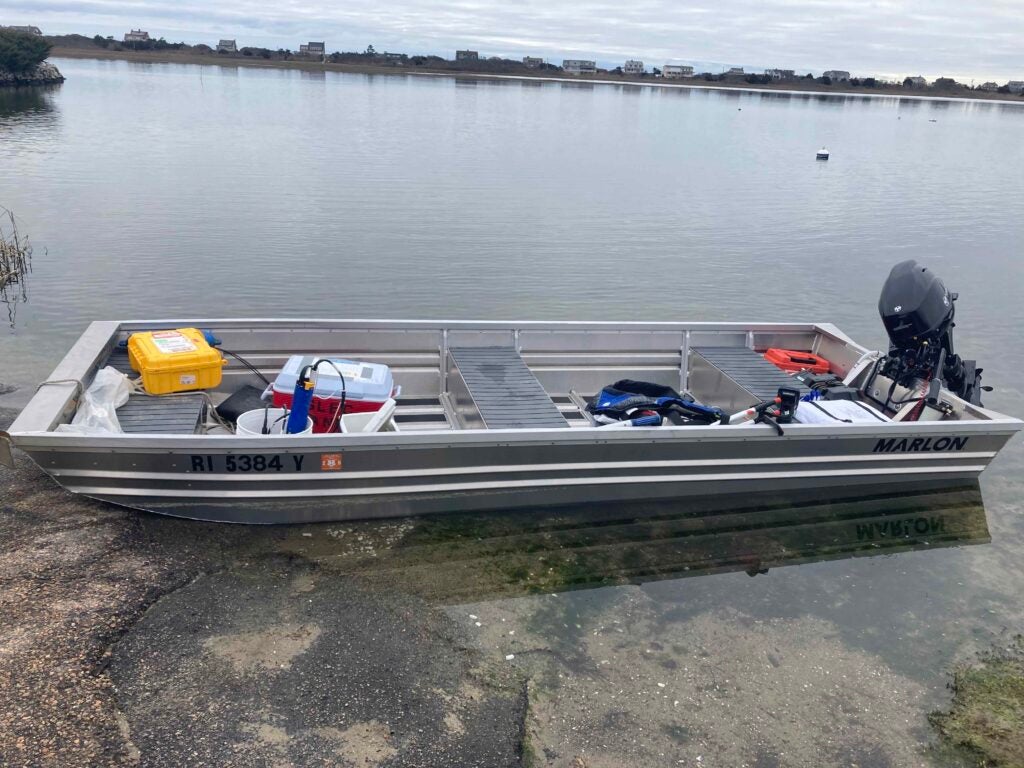
Maritime Skiff 20P
The Maritime Skiff 20P is a great light-duty work boat. It is equipped with a davit for small/light-duty scientific equipment deployment and recovery. The Maritime is also equipped with a dive ladder and SCUBA tank holders, as well as a small pilothouse to get out of the elements. The walkaround layout allows for ample storage of scientific gear and sampling equipment.
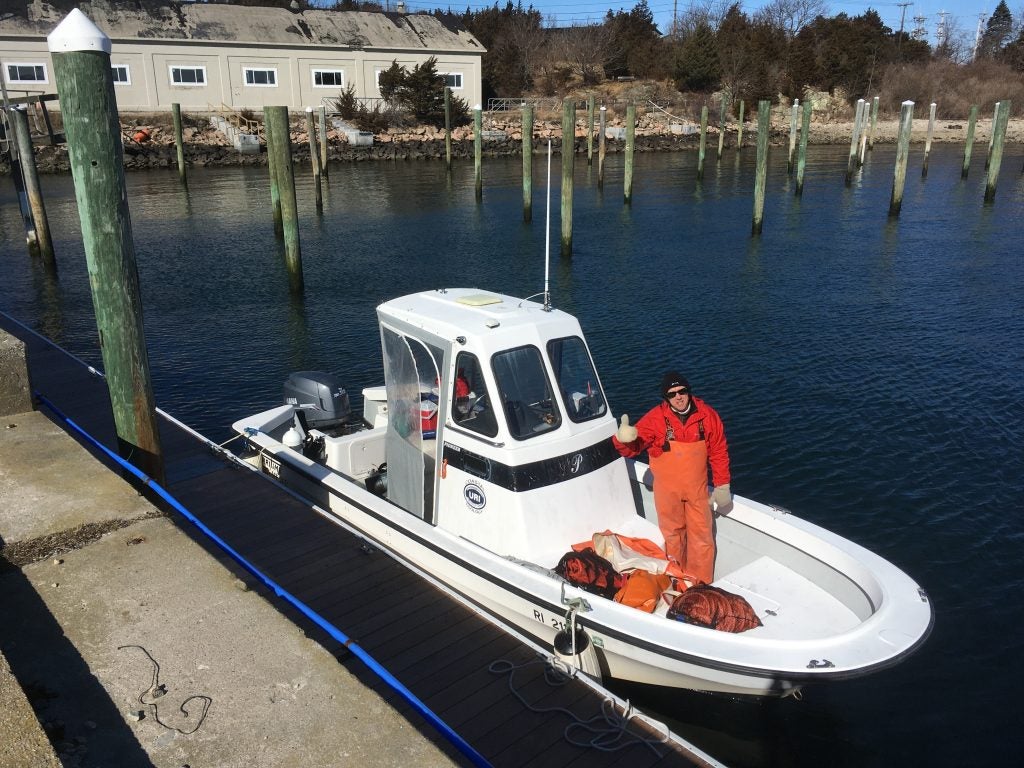
Lyman Morse 26
Lyman Morse 26 is a 26’ pilothouse style aluminum work boat. Designed by Bill Lincoln of Response Marine, and built by Lyman Morse Metal Fabrication, the hull was specially designed for enhanced stability and handling at rest and at lower speeds, typical of oceanographic sampling.
The boat is powered by twin 200 horsepower commercial duty Mercury outboard engines. The boat features an aft towing bit and engine guard rail, a starboard dive door with removal ladder, davit with electric winch, starboard side pole-mount system and auxiliary sensor rail mounted above the pilothouse. The pilothouse and cabin spaces are heated, with bench seating and a fold up table, and a portable marine head.
Two 8D lithium iron phosphate batteries and inverter charger provide 120V power. Garmin multifunction display with GPS, radar, spotlight and ample deck lighting make day or night operations safe in Narragansett Bay and RI coastal waters. The boat has a dedicated Venture trailer.
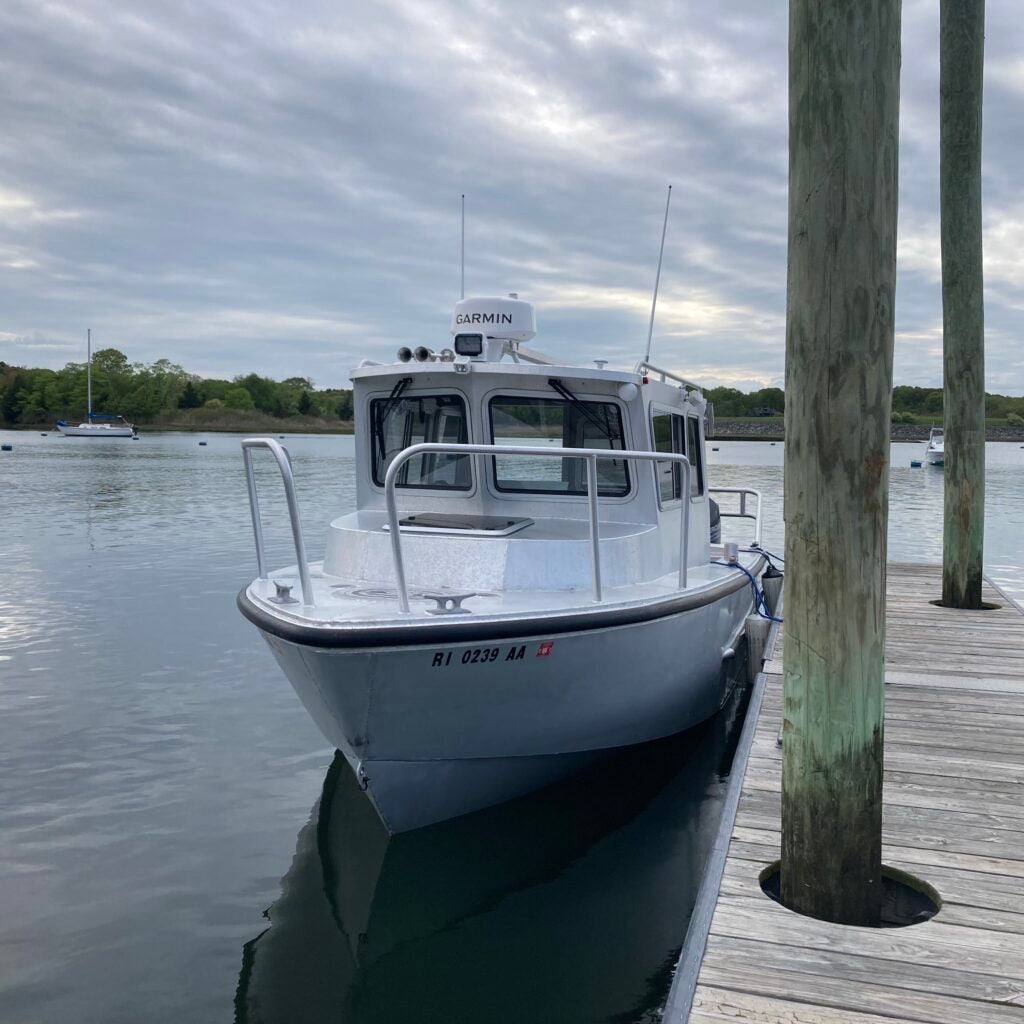
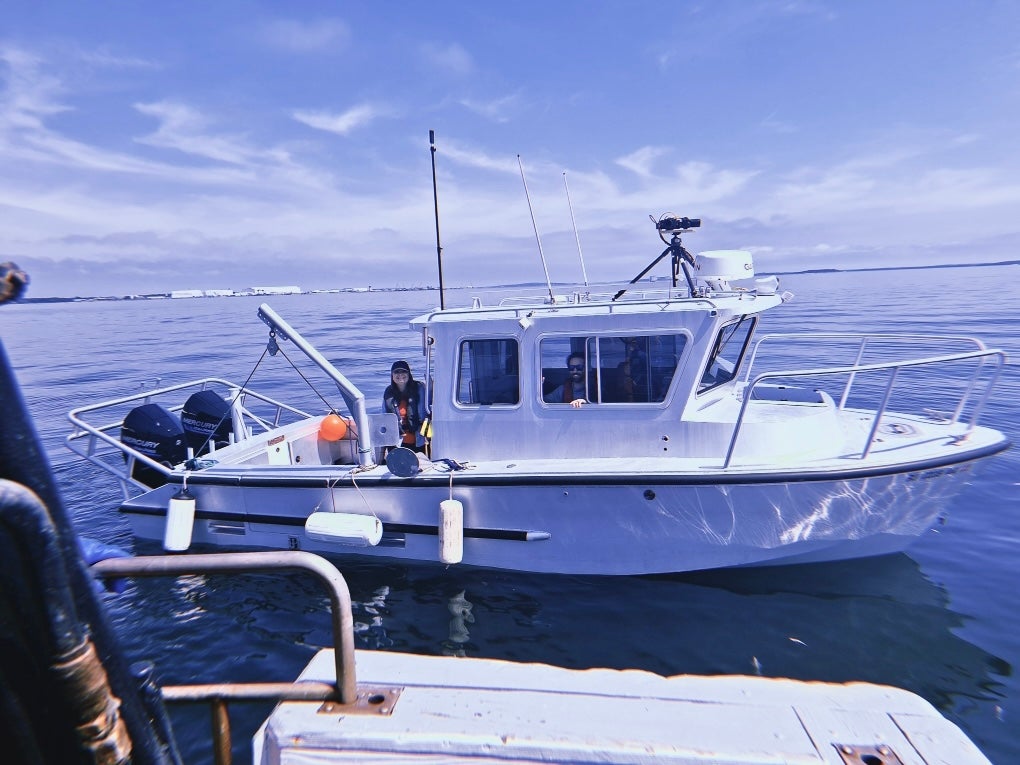
R/V Shanna Rose
Research Vessel Shanna Rose is a seaworthy lobster boat converted for research. It is well suited to coastal waters of Narragansett Bay, Block Island and Rhode Island Sounds. The R/V Shanna Rose is well rigged for geological sampling, including vibracores, grab sampling and geophysical survey. A fully enclosed and heated pilothouse and lab space provides comfortable work conditions year-round. An open transom makes it an easy boat for diving operations.
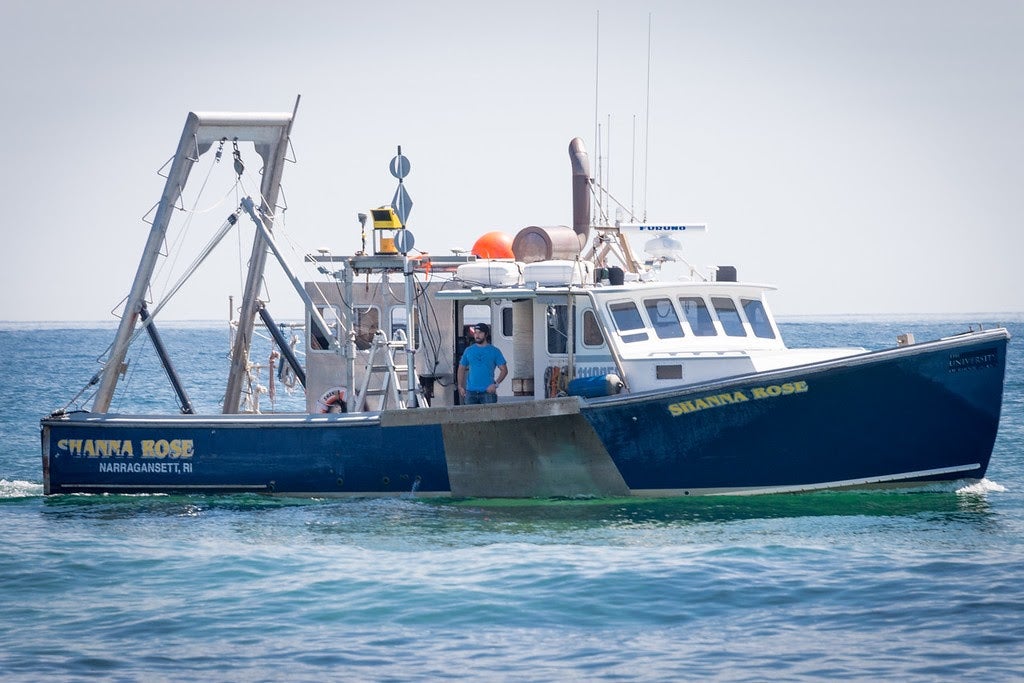
Small Boats Specifications
| Marlon 14 | Maritime Skiff | Lyman Morse | Shanna Rose | |
|---|---|---|---|---|
| Manufacturer | Marlon | Maritime | Lyman Morse Metal Fabrication | “Wesmac Hull Finished by Clark Island Boat Works” |
| Year | 2024 | 2001 | 2025 | 2000 |
| Length | 14′ | 20′ 7″ | 26′ 6″ | 42′ 3″ |
| Beam | 5′ 3″ | 7′ 7″ | 8′ 6″ | 14′ 6″ |
| Max. Draft | 0′ 3″ (engine up) | 1′ (engine up) | 1′ 7″ (engines up) | 4′ 11″ |
| Displacement | n/a | n/a | 8,100 lbs | ~30,000 lbs |
| Power | 20 HP Tohatsu tiller outboard | 115 HP Yamaha Outboard | 2 x 200 HP Mercury Sea Pro Outboards | 700 HP Lugger/Northern Lights Turbo-diesel, fresh water cooled with raw water heat exchanger |
| Fuel | Gasoline | Gasoline | Gasoline | Diesel |
| Fuel Capacity | 3 gallons | 29 gallons | 90 gallons | 600 gallons (2 x 300-gallon tanks) |
| Cruise | 15 KTS | 23 MPH | 25 KTS at 3500 RPM, 45 KTS at 5500 RPM | “20 MPH at 1850 RPM 33 MPH at 2300 RPM” |
| Features | 500W 120V inverter, automatic bilge pump | “Davit Dive ladder Pilothouse with “”child”” berth New (2020) aluminum dual-axle trailer” | “Davit with electric winch Removable dive door & dive ladder 1 portable marine head Raw water washdown” | “Pilothouse with V-berth and second starboard helm station 2 x inflatable 4-man rafts 40-gallon freshwater holding tank 1 marine head” |
| Electronics | Garmin Echomap depth finder | “Hardwired VHF Radio Garmin GPSmap 541s DGPS Garmin Fishfinder 90″ | “Chartplotter: Garmin GPSMAP 1242xsv Radar: Garmin GMR 18xHD Transducer: Airmar SS60 thru-hull Lighting: Spot light, deck flood lights, cabin lighting (red/white) Compass: Ritchie 5″” Heater: Eberspacher diesel heater with 3 gallon diesel tank (2) 300 AH 8D Lithium Iron Phosphate batteries with 2000W Xantrax 120V inverter charger (2) Standar Horizon VHF radios (2) 1100 GPH bilge pumps” | “Northern Lights generator Radar: Furuno NAVNET 48-nm range GPS: Furuno DGPS GP-36 Chartplotter: Garmin GPSMAP 1022x Depth Sounding: Furuno FCV-292 Color Video Sounder Compass: (2) Ritchie 5″” VHF Radio: (2) ICOM IC-M127 Autopilot: Robertson/Simrad AP-35 EPIRB: ACR/SAT-2406 with Hydro-Fix hydrostatic-release” |
| Hydraulics | n/a | n/a | n/a | “Pullmaster hydraulic winch with cable-drum and hydraulic control assembly A-Frame, rated to 8,000 lbs Hydraulic pot-hauler with hydraulic control assembly Second deck-mounted hydraulic winch” |
Small Boats Rates
| Marlon 14 | Maritime Skiff | Lyman Morse | Shanna Rose | |
|---|---|---|---|---|
| Half Day, no captain | $56 | $189 | $252 | n/a |
| Full Day, no captain | $91 | $314 | $418 | n/a |
| Half Day, with captain | $254 | $387 | $450 | $1,418 |
| Full Day, with captain | $289 | $512 | $616 | $2,835 |
How do we use our small boats?

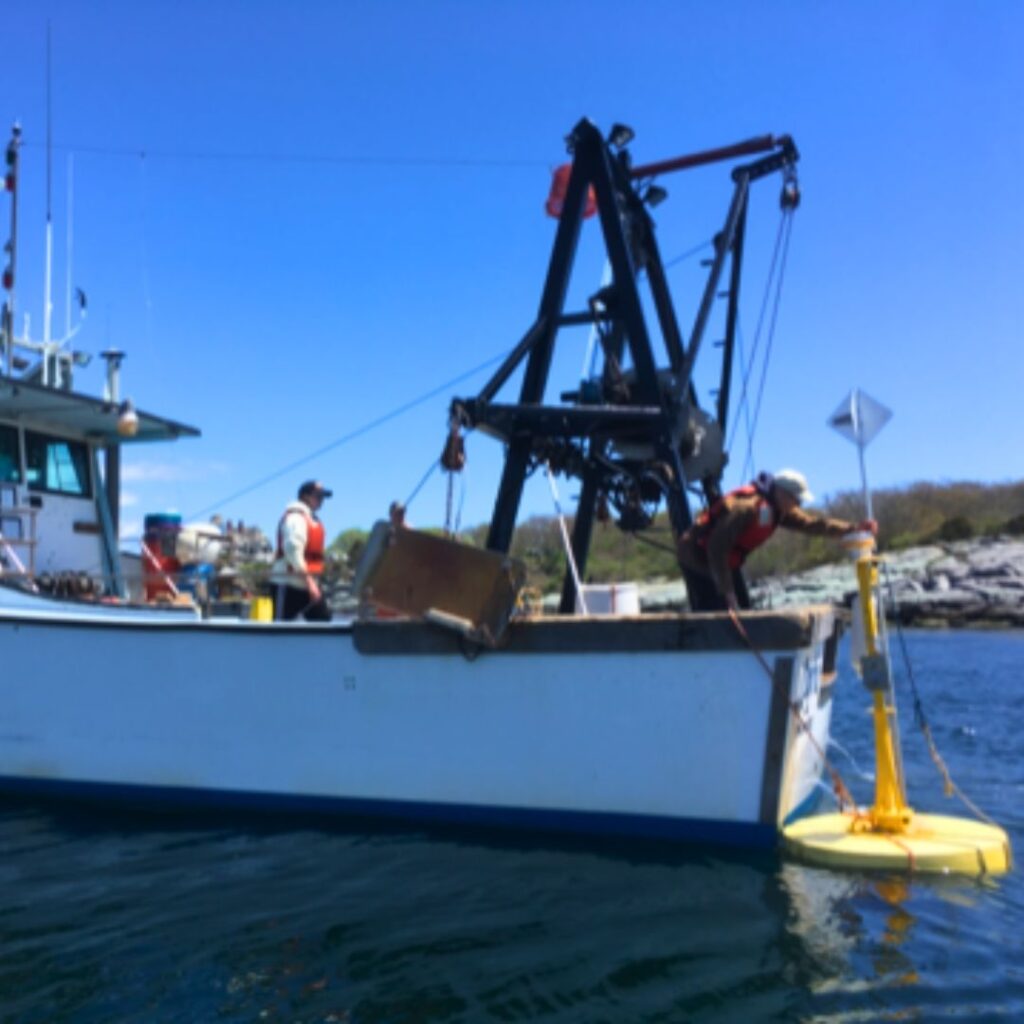


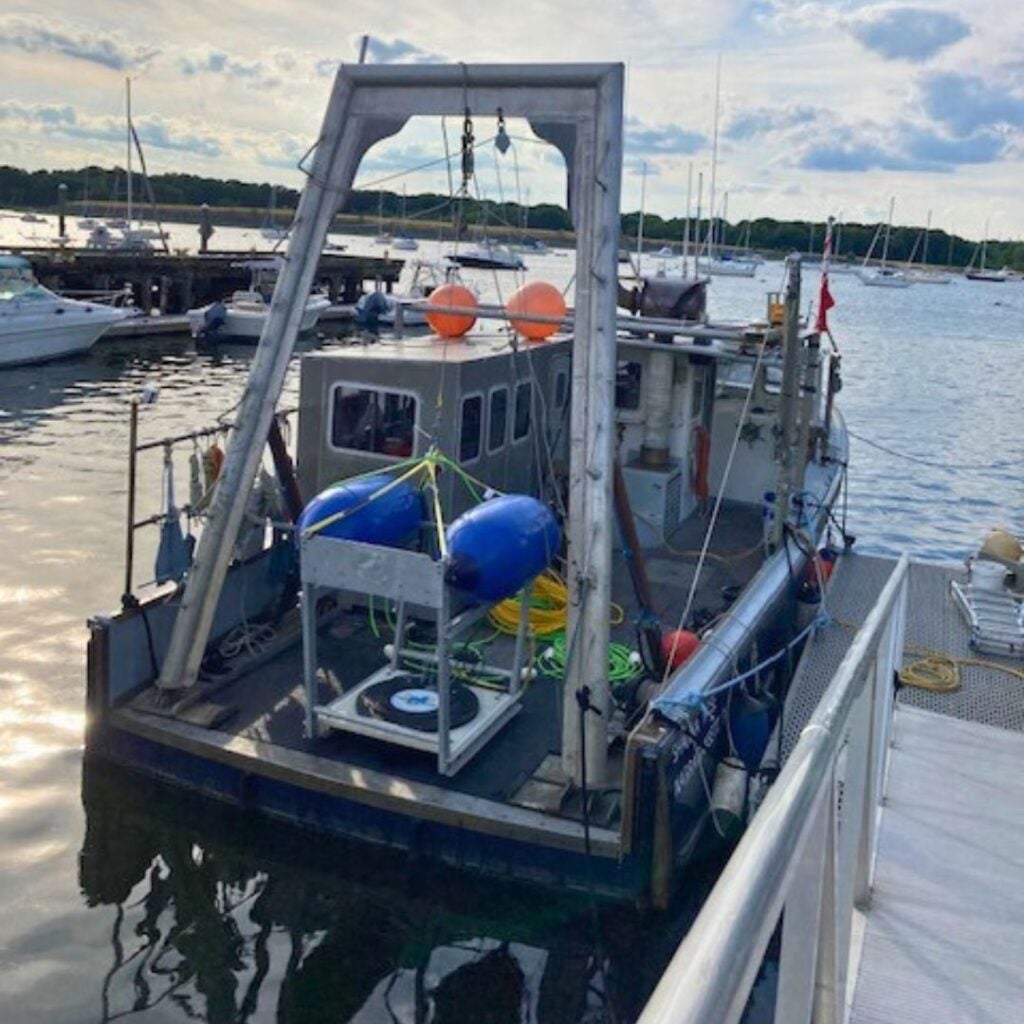
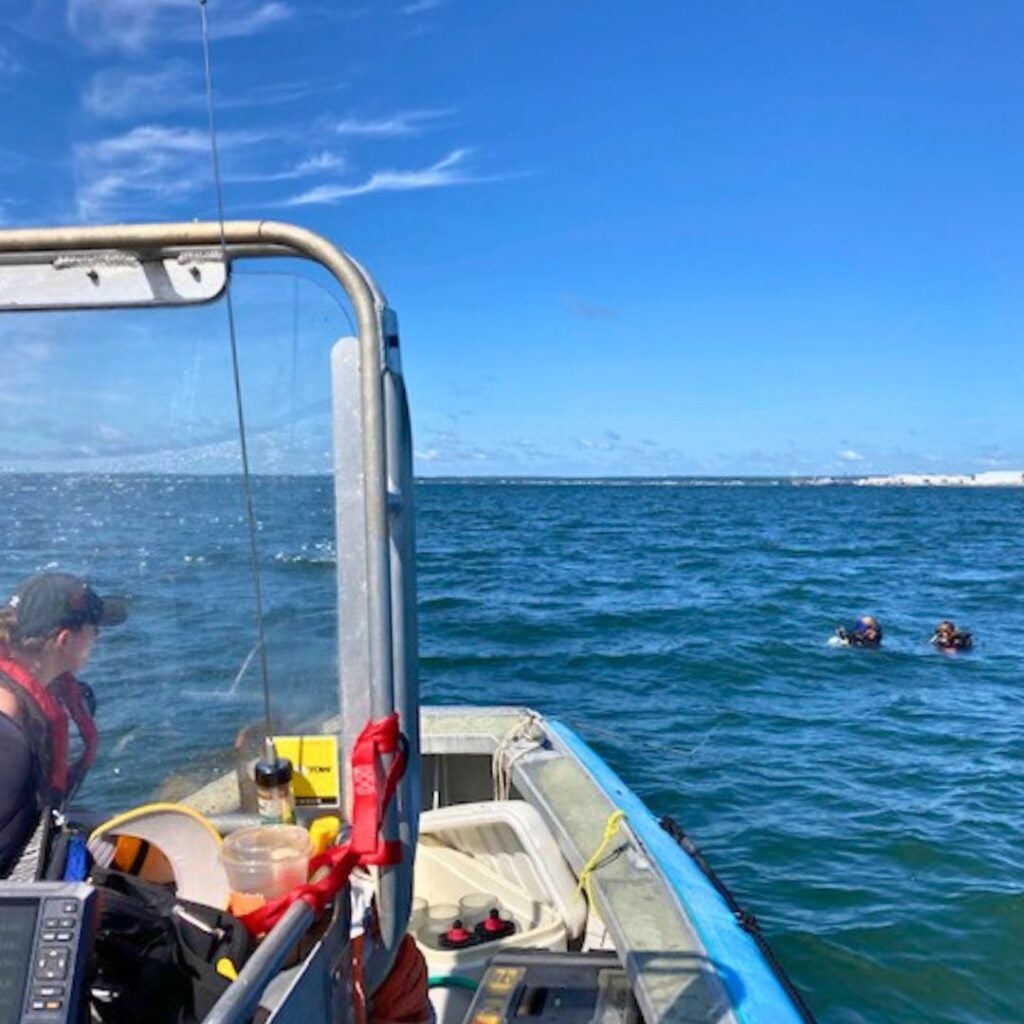
SBSA and MOTC
The University of Rhode Island is an organizational member of the Scientific Boating Safety Association (SBSA) and a regional provider of the Motorboat Operator’s Training Course (MOTC).
The MOTC is an immersive 4-day introductory boating safety and survival skills training course. The course is a professional boating standard designed to train scientists how to use small power boats for scientific missions. The foundational knowledge and skills learned in the MOTC include navigation rules, federal and state boating law, boat handling, seamanship, trailering a boat and self-rescue, emergency, and survival techniques. The MOTC is accepted by the US Department Of Interior, NOAA and other SBSA-member institutions. The course utilizes the URI Narragansett Bay Campus, URI Tootell Aquatic Center and URI Allen Harbor Facility.
The MOTC is offered on an annual basis, typically at the conclusion of Spring semester. Please contact Brian Caccioppoli for more details and coming courses.
